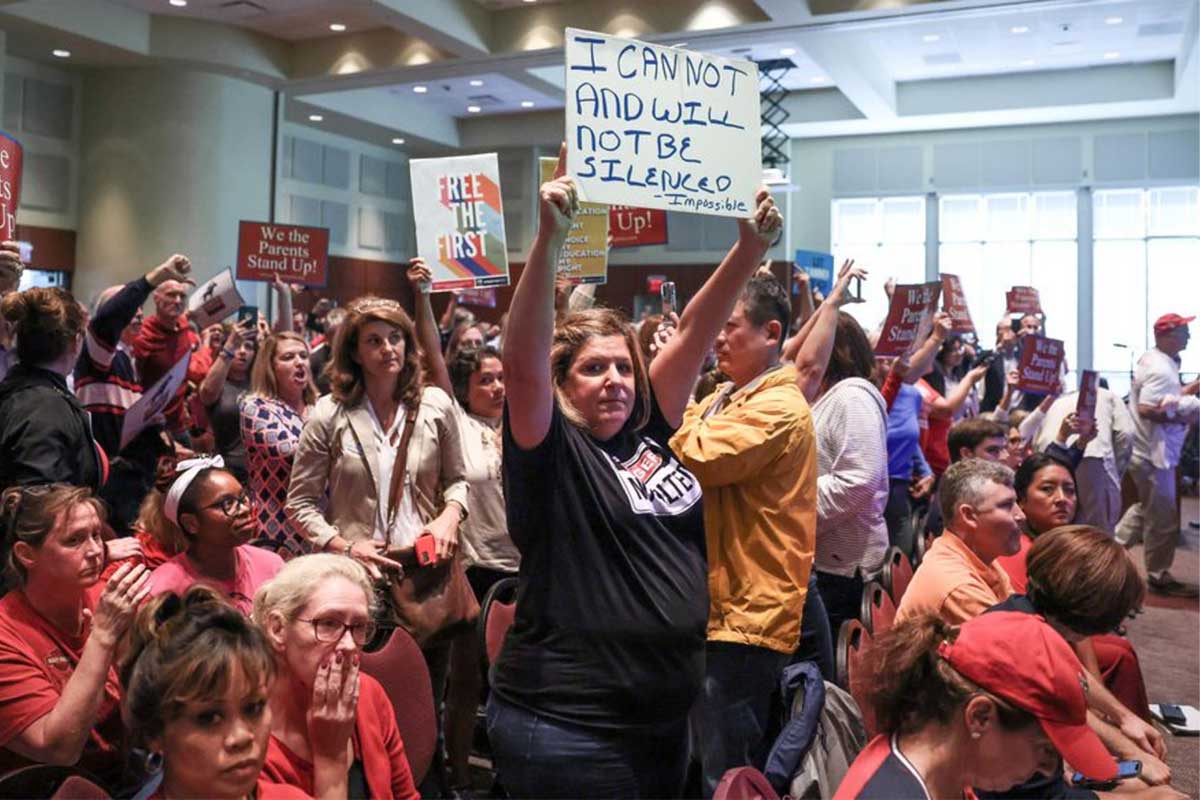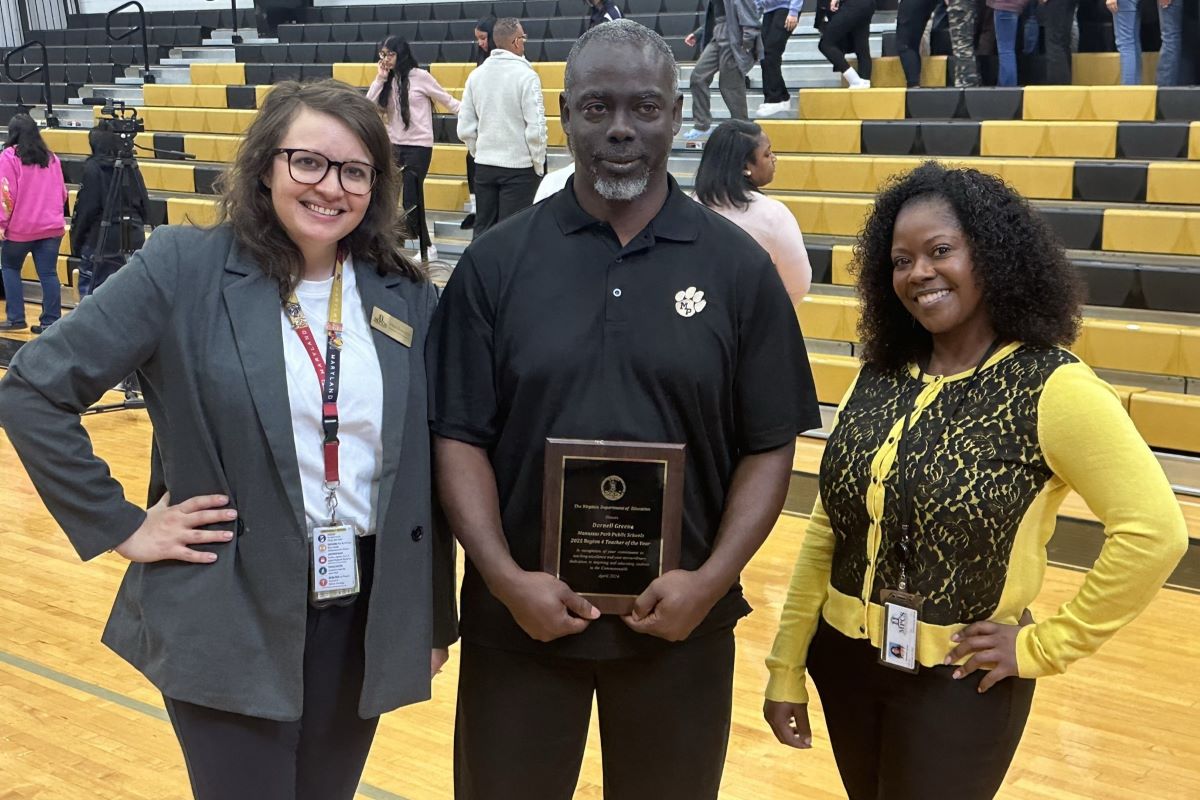More than 300 people packed into the Loudoun County School Board meeting room on the evening of June 22. Topics were up to the attendees, but for most speakers, there was only one—the recent lawsuit by a Leesburg Elementary School teacher against the Loudoun school district. On one side: the district, which was trying to introduce a new school policy protecting the rights of transgender students. On the other: the teacher, who argued that because he’d been banned from school grounds for opposing the policy, he’d been denied his right to freedom of speech. It didn’t take long for things to come to a head.
About 10 minutes into the public comments, for which 259 people had signed up, Kellie Herring, the mother of a transgender Loudoun County student, addressed the hate in the room that “seems to be dripping off the followers of Jesus.” Another speaker, Borsika Szivos, claimed to have a message from God, who, she said, was taking the school back. God said that all the board members should resign “for their evil work,” she told the board. “‘I protect the youth from your lies by a ring of fire,’” she quoted God as saying. This was greeted with applause and outbursts from the crowd.
Then recently retired Virginia State Republican Sen. Dick Black stepped up to the mic, speaking loudly. “It’s absurd and immoral for teachers to call boys ‘girls’ and girls ‘boys,’” he said. “You’re making teachers lie to students.”
Big cheers. More yelling. Loudoun County Public Schools board chair Brenda Sheridan had had enough. “Give me the gavel,” she said.
She slammed it down. Public comment was ended.
It marked a clear escalation in an ongoing conflict that runs through the heart of the historically red, rapidly turning blue Loudoun County. But the discord and inflammatory rhetoric was not new for a Loudoun County School Board meeting. The school district has made national headlines in recent months for raucous debates in which conservative parents have accused the school board of promoting liberal causes such as teaching critical race theory, a characterization the school board has repeatedly denied.
Now, the debate—centered around Loudoun County teacher Tanner Cross and his fierce opposition to the use of transgender pronouns—has suddenly swung to the issues of gender identity and free speech. The result has been an appeal to the Supreme Court of Virginia, an arrest, and reports of vicious threats, while everyone from activists to interest groups to media personalities weigh in.
The once-quiet Loudoun County School Board meetings now seem permanently stuck in a media firestorm. And as the Loudoun school district debates become entwined with the national discourse, the question of where these ever-more chaotic, even violent, debates are headed is increasingly tied to the nature of the national discourse itself.
As is to be expected in Loudoun nowadays, the current uproar started with another school board meeting. The Loudoun County School Board, which governs the school system, was hoping to adopt a policy regarding the rights of transgender students based on a model policy created by the Virginia Department of Education.

That policy, 8040, directs teachers to use transgender students’ preferred gender names and pronouns; allows transgender students to participate in sports using their chosen gender identity, per the rules of the Virginia High School League; allows transgender students to use locker rooms and restrooms that correspond to their gender identity; and requires school mental-health professionals to complete training to help them understand LGBTQ issues, including watching out for harassment or discrimination based on gender identity (teachers must acknowledge they’ve at least read the policy).
When approved, the policy would be used by educators of more than 81,000 students in the 17 high schools, 17 middle schools, 59 elementary schools, and two educational centers that make up the school district.
The school board held an open discussion on the policy on May 25. That’s when Tanner Cross, a Leesburg Elementary physical education teacher, a conservative Christian, and a resident of Hamilton, Virginia, decided to speak up.
“We condemn school policies like 8040 and 8035, because it would damage children and defile the holy image of God,” Cross said. “I am a teacher, but I serve God first, and I will not affirm that a biological boy can be a girl and vice versa because it’s against my religion. It’s lying to a child. It’s abuse to a child. And it’s sinning against our God.”
Two days after the school board meeting, Cross was put on administrative leave by Lucia Villa Sebastian, interim assistant superintendent for human resources and talent development for LCPS. He was banned from attending any more school board meetings or setting foot on school property.
Cross’ comments kicked off a firestorm of controversy that would go on for months. But they weren’t completely out of character for a school district that, in recent years, has become a political spectacle in itself.
Loudoun County is evolving from a county of simple farmlands into a collection of small but fast-growing commuter towns with a more liberal bent. Over 100,000 people moved to the county in the past 10 years, nearly a quarter of the county’s total population today, and the immigrant population of the county has more than doubled during that same period.
It’s also the richest county in the country. New, powerful voices seeking to shape the county’s politics are intent on being heard—and have the financial and legal backing to do so. Several high-profile lawsuits had already been filed against the school board on race-based policy and education before Cross’s comments. According to NBC News, the Loudoun County debates were covered by Fox News on at least 24 broadcasts in one two-month period.
Cross, in particular, has gained approval from national conservative media and political figures, including Virginia Republican gubernatorial candidate Glenn Youngkin. Perhaps most significantly, he received support from nonprofit conservative advocacy group Alliance Defending Freedom, which has filed 14 and won 13 Supreme Court cases since 2011.

Cross and ADF got to work quickly. On May 28, Cross responded to being put on leave with a letter through his lawyer, Tyson Langhofer of ADF, requesting to be reinstated. That same day, the lawyer representing the school system, Stacy Haney, sent him an email, denying his request.
So on June 1, citing his First Amendment rights to freedom of speech, Cross sued Loudoun County Public Schools, seeking to be reinstated.
In the Cross lawsuit, Langhofer wrote that the school “violated his constitutional rights to free speech and free exercise of religion” by suspending Cross “in retaliation for his speech during the board meeting.” The action by the school, Langhofer said, was “absolutely a knee-jerk reaction” to what were essentially complaints by just three or four parents about Cross. According to Langhofer, the country is undergoing a big debate about gender and how society responds to it. “What Loudoun County is trying to do is shut that debate down before it even begins,” Langhofer says. “They are trying to shut out the voices that really should have the most importance. And that is the teachers who are going to be in the schools dealing with this. Their rights need to be considered as well as their views about how these policies would affect the students.”
On June 8, Circuit Judge James Plowman Jr. agreed with Cross’s religious liberty and freedom of speech arguments. Cross would have to be reinstated. “The Court finds that the Plaintiff’s [Cross] speech and religious content are central to the determination made by the Defendants to suspend Plaintiff’s employment,” Plowman wrote in his opinion about the case.
Three days later, LCPS fired back. It would appeal the ruling to the Virginia Supreme Court. In a press release announcing its appeal, the board wrote that while LCPS respects the rights of public-school employees to free speech and free exercise of religion, “those rights do not outweigh the rights of students to be educated in a supportive and nurturing environment.”
The press release also stated that both Leesburg Elementary School and LCPS had experienced “significant disruption since the May 25 School Board meeting during which Cross addressed the board. Many students and parents at Leesburg Elementary have expressed fear, hurt, and disappointment about coming to school. Addressing those concerns is paramount to the school division’s goal to provide a safe, welcoming, and affirming learning environment for all students.”
Public information officer Wayde B. Byard added that “because this involves pending litigation, this will be the extent of LCPS’s comments on this matter.”
With a potential Supreme Court ruling on the horizon, Loudoun is moving to the center of the debate on transgender rights in schools at a time when movement on the issue is accelerating in governments in the region.
Mark Eckstein, an advocacy co-chair for the metro DC Parents, Families, and Friends of Lesbians and Gays, points to a law that Virginia passed last year, part of Virginia Code Title 22.1, which affirms transgender children and shows the protocols and guidelines for school districts to follow. “Maryland has that. DC has that. A bunch of different school districts already have that in place,” says Eckstein. “We see mandates to make this more universal.”
The winds are “blowing differently” on this issue, he says, especially in light of the June 28 Supreme Court ruling for former Virginia transgender student Gavin Grimm, where the court declined to hear an appeal to a 2020 circuit-court ruling that found in favor of Grimm and his right to use bathrooms that match his gender identity. The ruling found Grimm was protected under Title IX, which bars sex discrimination in education.
“And the Supreme Court is a pretty conservative court. So I think this is a very uphill battle for the opposition,” Eckstein says.
There is a vocal cohort of conservative residents unhappy with this state of affairs, and they’re making their opposition heard at school board meetings.
On June 8, the same day Cross was ordered to be reinstated, the school board meeting got heated. Speaker after speaker—121 were scheduled—stepped up to the mic, most to complain about the board’s members, evoke God’s gift of biological gender, and maintain that the board had a systemic leftist problem.
Two weeks later, at the subsequent school board meeting, all those words reached a point of crisis. Confusion, misunderstandings, communication issues, fear for their children—all were part of the June 22 meeting, according to people in attendance. And the result was physical violence.

After Sheridan banged her gavel and ordered public comment closed, as the room cleared, a fight broke out. A man identified as Scott Smith was arrested and charged, according to Buzzfeed, with obstruction of justice and disorderly conduct. It was one more step on an increasingly troubling road.
Two days after the meeting, white supremacist, Ku Klux Klan propaganda fliers were found outside homes in Leesburg and Ashburn, calling for opposition to the transgender and racial equity policies at the school, according to the Loudoun County Sheriff’s Office.
“Dog-whistle politics will not delay our work,” Sheridan later wrote in a statement about the meeting, citing “graphic threats via email and voicemail” that board members were getting.
Any further discussion about the policy at the board’s public meetings will not feature a banned Tanner Cross—though there will continue to be public support for him, inside and outside the Loudoun community. But even as the debate remains closely watched on the national stage, figures on either side of the conversation may be talking past each other.
“I don’t think the Cross case is about free speech in public,” Eckstein says. “That is not what got Cross into trouble. What got him in trouble was that this teacher was not following the rules.” Ultimately, when Loudoun residents hear about acknowledging a young student’s transgender identity, it will continue to elicit polarizing reactions.
“People have to educate themselves … People would feel more comfortable if they understood that biology is separate from gender,” Eckstein says. “We all need to step up and create a dialogue and have these discussions.”
Editor’s note: On August 30, 2021, the Virginia Supreme Court ruled that Loudoun County Public Schools is required to reinstate Cross after suspending him for refusing to use transgender students’ pronouns.
This story originally ran in our September issue. For more stories like this, subscribe to our monthly magazine.




